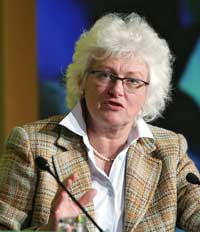SFPs must stay says EU commissioner

EU agriculture commissioner Mariann Fischer Boel has set out her vision for the CAP post-2013, calling for a sufficiently large budget to deliver on food security, the protection of natural resources and wider rural development.
In a speech to Swedish farmers in Stockholm, she agreed that markets played an essential role in providing food.
“But policy must help to shield our productive base against crises and physical damage,” she added. “If we allow global food production to be too highly concentrated in key areas of the world, our food supply will be very vulnerable to bad weather, diseases and unstable political regimes.”
As for what policy instruments should apply, Mrs Fischer Boel was adamant that the single farm payment has a future beyond 2013.
“The fundamental benefit is that by supporting farmers through direct payments, we help them to stay on the land around the European Union. This is the key that opens the door to vital benefits in terms of the environment and food security,” she said.
“If farmers leave; no-one will move in to replace them. The land will be abandoned and even turn into desert.”
On top of this, cross compliance ensured that farmers met certain baseline environmental standards to protect the environment as a condition of receiving their aid.
But Mrs Fischer Boel was convinced that basing SFPs on what farmers had produced in the past could no longer be justified. “Payments must be better targeted at objectives,” she said.
One idea was to provide a uniform rate of SFP across the EU, then vary it between zones according to economic and environmental criteria. “I think we could find a good solution,” she said.
But whatever form the SFP took, Mrs Fischer Boel was adamant that the CAP should have a sufficiently large budget. Without proper funding many farmers would go bust “because of the importance the support has for farmers’ incomes”.
She also called for a beefing up of the rural development budget, to deliver more in terms of rural development and climate change control. And she opposed any move to renationalise the CAP. “That’s a recipe for serious problems.”
* For more on this story, see Phil Clarke’s Business Blog
